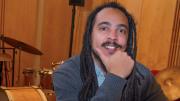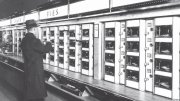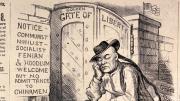"Last night Harvard College suffered the most ruinous loss it ever met with since its foundation," begins a broadside printed in Boston on January 25, 1764. "In the middle of a very tempestuous night, a severe cold storm of snow attended with high wind, we were awaked by the alarm of fire. Harvard Hall, the only one of our ancient buildings which still remained, and the repository of our most valuable treasures, the public Library and Philosophical Apparatus, was seen in flames. As it was a time of vacation, in which the students were all dispersed, not a single person was left in any of the Colleges, except two or three in that part of Massachusetts [Hall] most distant from Harvard, where the fire could not be perceived till the whole surrounding air began to be illuminated by it. When it was discovered from the town, it had risen to a degree of violence that defied all opposition. It is conjectured to have begun in a beam under the hearth in the library, where a fire had been kept for the use of the General Court, now residing and sitting here, by reason of the Small-Pox at Boston....The books easily submitted to the fury of the flame...."
The College had possessed about 5,000 books. Only 404 volumes escaped incineration; some hadn't yet been shelved in the building, and 144 were out on loan. One survivor was the fourth edition, printed in London in 1634, of John Downame's The Christian Warfare Against the Devill World and Flesh: Wherein is described their nature, the maner of their fight and meanes to obtaine victorye.
The Reverend Mr. Harvard came from England to Charlestown, Massachusetts, in 1637 and died there a year later. He left half of his estate and all of his books (about 400 volumes) to the newly founded, not-yet-named, but promising college nearby. Into the copy of The Christian Warfare shown here, which resides in a case in the lobby of Houghton Library, librarian John L. Sibley, A.B. 1825, inserted a handwritten note on May 24, 1843: "This book is the only one in the Library which, beyond a doubt was given by John Harvard....The numbers 3.2.8 on the blank leaf at the beginning denote the place it occupied in the library which burnt...."
The Christian Warfare was checked out of the library on October 14, 1763, for a maximum, according to the rules of the day, of three weeks. Unless the borrower had secured the written permission of President Edward Holyoke to keep it longer, the book--still out on the night of the fire-- was seriously overdue. The delinquent library patron was one Ephraim Briggs, a senior. Hallowed be his name.
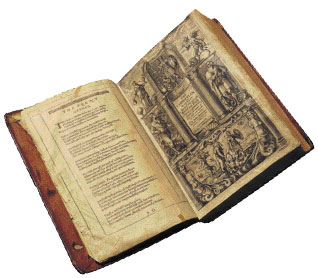 | 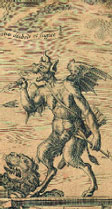 |
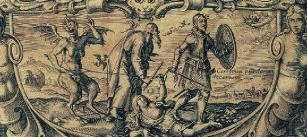 | 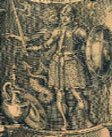 |
| Top left: The Christian Warfare and details of its frontispiece. Top right: "Sathan...His poysoned fiery Darts against him flingeth." Bottom left: "Vntill at last full Victory he gaines, Treads, tramples on their Crests with feet victorious, In triumph leads them captive...." Bottom right: "The Christian Souldier...Prepares to make resistance in tentation." | Widener Library Photographic Services, Robert Zinck |



